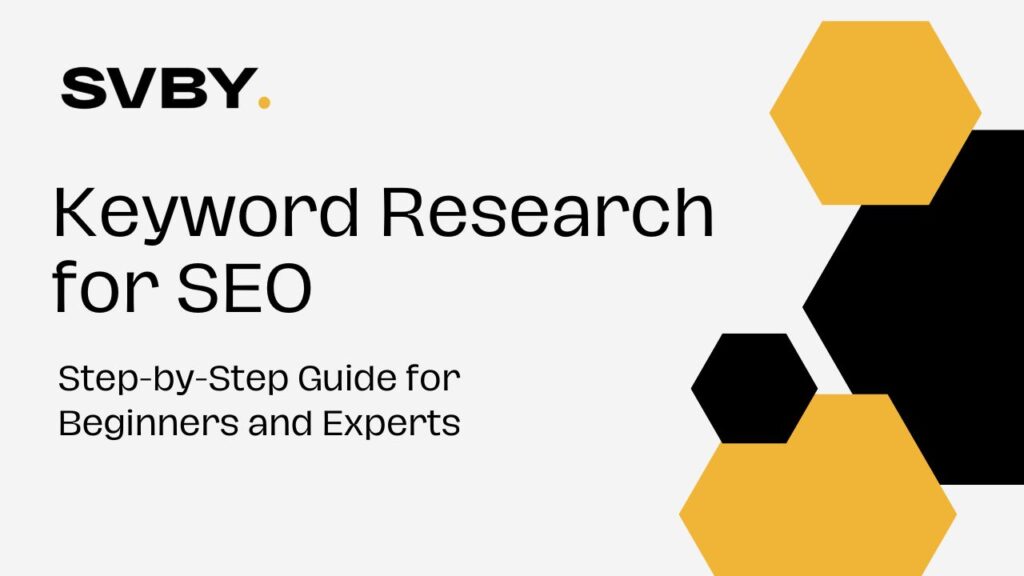Years of experience are necessary to develop an effective digital marketing strategy. Nevertheless, even the most accomplished digital marketing professionals require the appropriate tools to deliver valuable results, whether they require search engine optimization (SEO), pay-per-click (PPC) ads, or a combination of all strategies. The individuals responsible for your digital marketing strategy must be well-equipped with the most recent tools to ensure that they remain at the forefront of the ever-changing digital landscape.
We are utilizing pertinent digital marketing tools as SVBY Agency advances in 2024. These assist in the automation of repetitive tasks, enable us to remain at the vanguard of your competition, and enable us to concentrate on tasks that are essential for the expansion of your digital marketing.
In order to determine your digital growth strategy for 2024, it is necessary to investigate your options and gain insight into the digital marketing services, online marketing tactics, and potential return on investment (ROI) of an agency.
Predicting Trends in Digital Marketing for 2024
In response to the changing trends in digital marketing and user behavior, a plethora of emergent marketing technologies were observed in the previous year. We are optimistic that certain key trends will persist into 2024. These are a few of the trends that we anticipate:
Personalized Experiences
In recent years, personalization has become increasingly prevalent; however, the increasing prevalence of AI in marketing has rendered it an essential strategy for attracting users.
In the past, personalization was restricted to the transmission of personalized content to distinct demographics through software, such as email marketing tools. Currently, user demographics are more segmented, as users desire specific, distinct products and services from a brand. This is the reason why a greater number of individuals anticipate personalized content and experiences that are tailored to their interests, requirements, and preferences.
This implies that digital marketing growth strategies will require a greater investment in data and analytics to further segment audiences into highly targeted campaigns. For example, PPC tools enable marketers to target specific demographics and determine whether the views generated by their advertisements are from the same demographic. This information could be utilized to modify their strategies.
AI-Driven Strategies
Your digital marketing ROI may be influenced by AI in marketing. For example, AI technology enables digital marketing strategists to make more intelligent and timely data-driven decisions.
Additionally, sophisticated algorithms are capable of analyzing consumer behavior, predicting future trends, and automating routine tasks, including content curation, A/B testing, and campaign optimization. Moreover, the implementation of AI in marketing has the potential to result in the development of AI-powered chatbots and virtual assistants that enhance customer support and improve the overall Customer Experience.
Voice Search and Conversational Marketing
The proliferation of voice-activated devices, such as Amazon Echo and Google Home, and smartphone features like Siri may contribute to a substantial portion of online searches.
Strategists must optimize for voice search and adopt a more natural and conversational voice that is compatible with direct communication tools in order to maximize their digital marketing ROI. This could also impact AI chatbots, social messaging bots, and other conversational tools.
Video Content Dominance
With the increasing popularity of social media platforms such as TikTok, a greater number of users are consuming short-form videos that are specifically designed for mobile devices. In addition to TikTok’s expansion, the platform introduced new features, including YouTube Shorts, Instagram and Facebook Reels, and live-streaming formats, which attracted a greater number of viewers. This presents a novel approach for brands to enhance their visibility and engagement.
Furthermore, Web design tools are essential for the development of responsive websites that facilitate the seamless viewing of content, as an increasing number of users are accessing content via mobile devices.
Sustainable and Purpose-Driven Marketing
A growing number of users, particularly those in the younger demographic, are becoming more aware of their influence on social issues and the environment. Consequently, digital marketers will be required to demonstrate their organization’s dedication to ethical practices, social responsibility, and sustainability. This may entail the development of content that emphasizes initiatives that have a positive impact or the establishment of partnerships with organizations that are dedicated to promoting change.
Data-Driven Decision-Making Tools
By providing specialists with a more comprehensive understanding of their target audiences, advanced analytics, and data-driven tools facilitate the expansion of digital marketing. These insights would enable businesses to develop hyper-personalized marketing campaigns that can improve consumer engagement by creating campaigns that are both relatable and relevant. Your brand’s message is tailored to specific consumer segments, and segmentation refinement guarantees that the appropriate messages are delivered to the appropriate audiences.
Conversion optimization tools are among the marketing tools that can assist in the development of data-driven digital marketing strategies by facilitating the comprehension, analysis, and enhancement of the performance of your digital marketing endeavors. The following are a few examples of conversion optimization tools that can be beneficial through data:
- Data Collection and Analysis: Collect and analyze data concerning website traffic, user behavior, and conversion rates.
- Split Testing: The process of comparing two web page versions, emails, or advertisements to ascertain which one performs better in terms of conversions.
- Segmentation: Businesses can gain a more comprehensive understanding of their target audience’s preferences and requirements by utilizing the data collected through conversion optimization tools. This information may be implemented to generate customized marketing content.
- User Experience Optimization: Recognize and resolve UX-related issues on your digital platforms. By examining user behavior, it is possible to pinpoint areas that require enhancement in the design, content, and navigation of a website.
Furthermore, these strategies enable your digital marketing strategists to identify emergent trends and opportunities to engage your brand in real-time and conduct real-time optimization.
AI-Powered Marketing Solutions
The manner in which strategists are expanding the boundaries of marketing is being transformed by artificial intelligence. Predictive analytics are now possible with AI-powered tools, which can aid in the development of personalized content. They are capable of predicting consumer behavior, identifying trends, and optimizing marketing initiatives. Marketers can strategically schedule their marketing campaigns and concentrate on high-value prospects by utilizing AI-driven algorithms to identify customers’ purchase patterns and preferences.
Furthermore, AI has the potential to optimize the production of dynamic and personalized content that is customized to the consumer’s unique requirements. This results in a personalized experience that is tailored to the preferences of each consumer, thereby increasing brand loyalty and engagement.
Social Media Management and Engagement Tools
The integration of social media marketing tools improves data collection, brand monitoring, and content curation. Strategists acquire valuable insights into consumer preferences, behaviors, and prevalent trends by employing digital marketing tools that provide comprehensive analysis. These insights allow brands to pinpoint their target audience and enhance their reach campaigns that are customized to market data.
Real-time interactions brand loyalty and trust are also facilitated by social media marketing tools. The utilization of social media marketing tools is essential for the monitoring, management, and mitigation of negative sentiments. By cultivating a sense of community through an active social media presence, we can increase brand affinity and generate engagement, thereby enhancing customer satisfaction and growth.
Content Marketing Platforms
Engagement, brand loyalty, search engine rankings, and online visibility are all enhanced by high-quality content.
The utilization of a variety of content marketing tools can simplify the process of content creation, distribution, and performance monitoring. These consist of:
- Planning and Creation Tools: These tools, such as Trello, Grammarly, and the Google Office Suite, assist in the management and creation of content.
- Distribution and Promotional Tools: These social media and SEO tools are employed to distribute or transmit content to specific audiences. For example, Buffer is a social media management tool that facilitates the creation and dissemination of social media content, while Mailchimp is an email marketing tool that simplifies the process of creating and distributing email marketing newsletters.
- Tools for Performance Tracking and Analytics: Performance and effectiveness must be evaluated in order to evaluate effective content marketing. By incorporating content marketing tools into your digital growth strategy, you can guarantee that your content strategy is effective, whether that entails utilizing BuzzSumo to monitor social media engagement or SEO tools like Moz to monitor SEO performance.
Emerging Technologies in Marketing
Digital marketing strategies may be improved by employing additional instruments. These may encompass:
Virtual Reality (VR)
Virtual reality provides an immersive experience that can significantly influence digital marketing strategies. Potential consumers can interact with and experience products or services before making a purchase decision by utilizing VR to create virtual showrooms or tours.
Augmented Reality (AR)
AR, like virtual reality, allows businesses to engage consumers in a distinctive and innovative manner. Product return rates are reduced and customer contentment is enhanced by the ability of customers to envision products in their surroundings prior to making a purchase. It can also be integrated with web design tools and geolocation data to provide targeted, location-based promotions and consumer offers.



 . The most reliable SEO Agency.
. The most reliable SEO Agency. 




